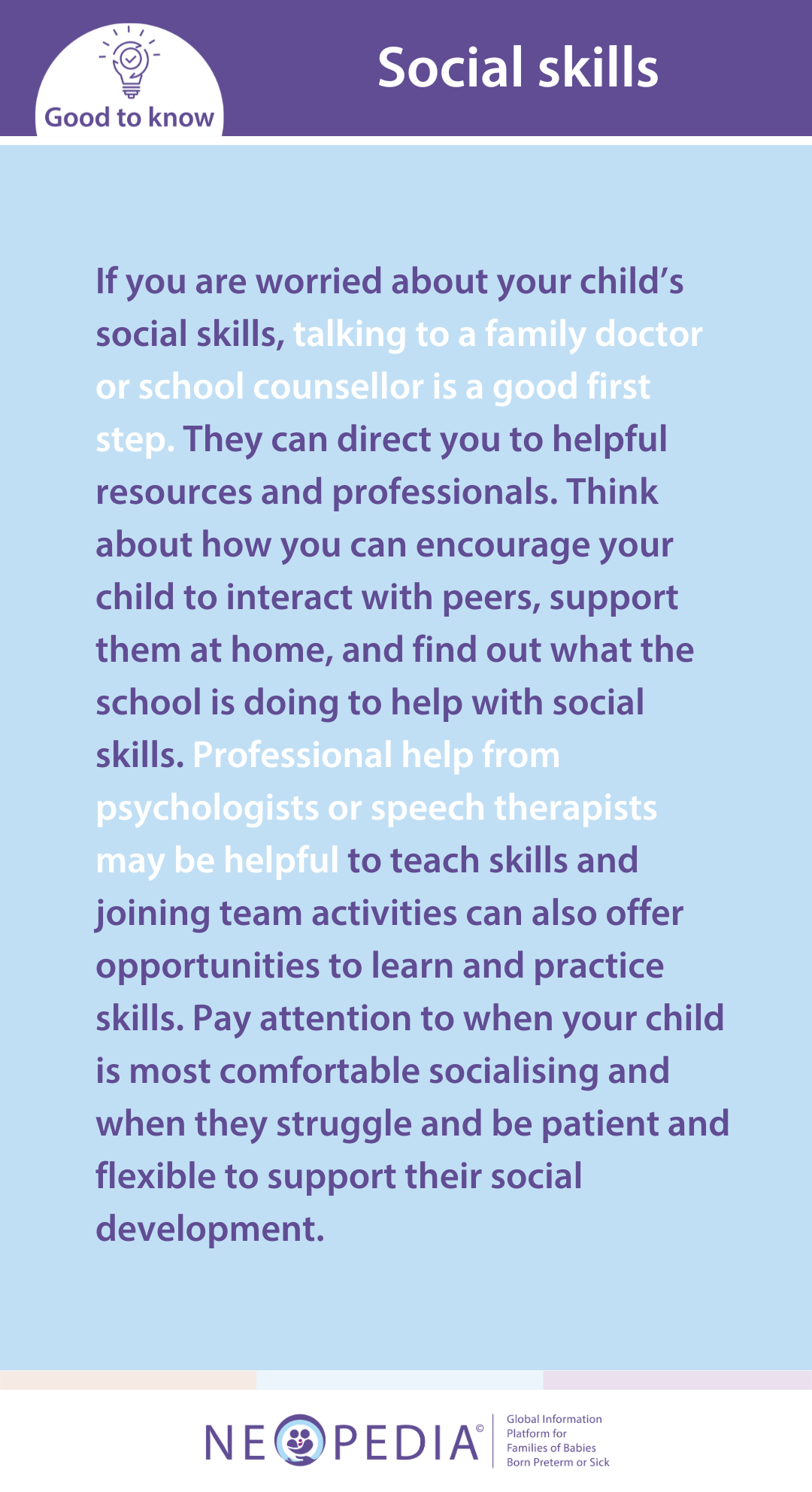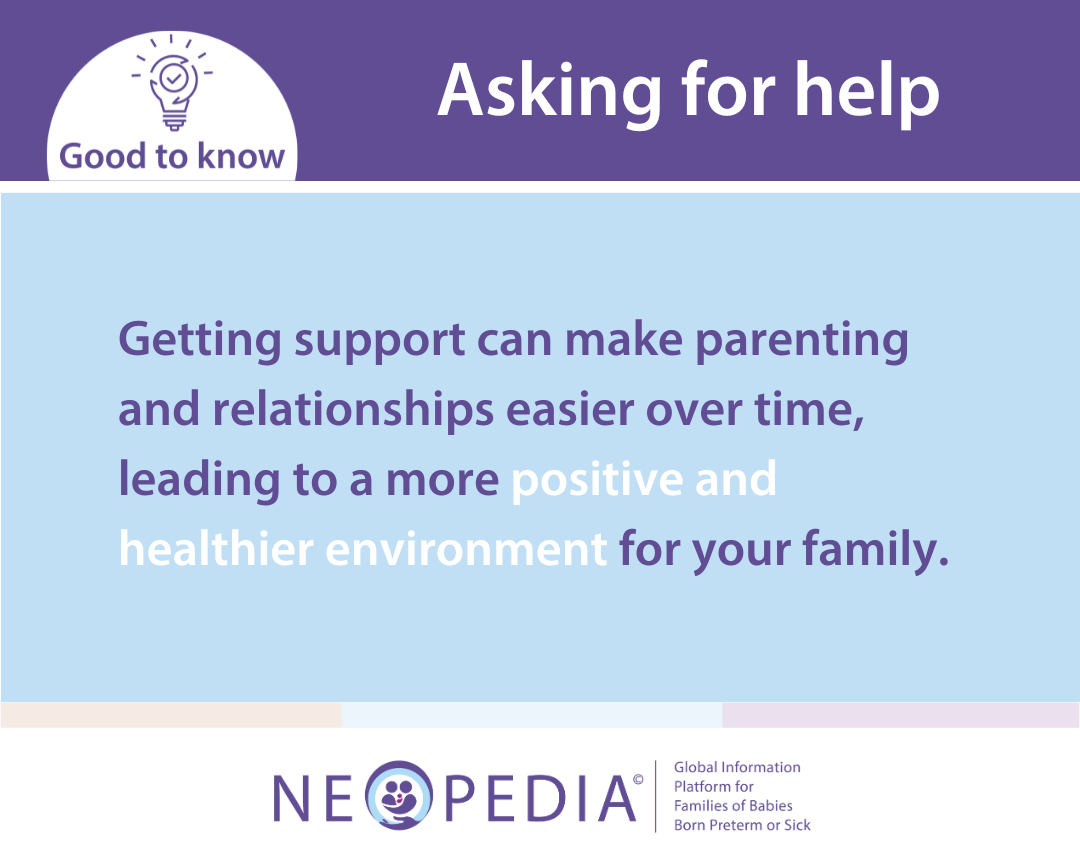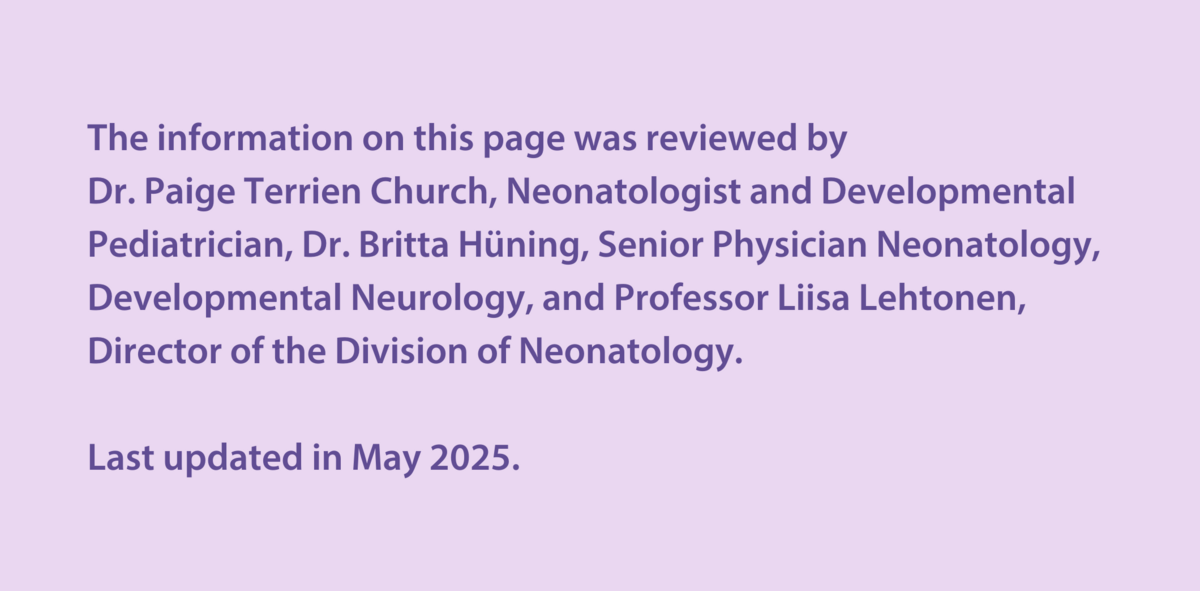Adults who were born preterm or with health issues sometimes face challenges with social interactions later in life. They might find it hard to manage their emotions, fit in, and handle social situations, which can affect their self-esteem and relationships.
Making new friends and attending social events can be difficult, and they might avoid these situations due to anxiety⍰ or fear of awkwardness. Additionally, learning difficulties can impact their ability to adapt to independent living and work.
While these challenges can be lifelong, getting support and therapy can make a big difference, helping them build better social connections and improve their overall well-being.

Children born very preterm may experience unique social and emotional challenges. Research shows that they are more likely to face challenges with making friends, managing emotions, and dealing with social situations. These challenges can last into adulthood and may lead to an increased risk of developing mental health issues like anxiety⍰ or depression⍰.
For many people, making new friends is easy, but it can be tougher for those born very preterm. They might feel anxious or uneasy in social situations, preferring to stick with familiar friends instead of meeting new people. This anxiety can make social events seem overwhelming, leading to avoidance and increased feelings of loneliness. They may also have specific fears, like speaking in public or eating in front of others, which can further complicate socializing. Recognizing these issues and understanding social anxiety is crucial for getting the right help.
Social skills, such as interpreting facial expressions and using body language, are important for making and keeping friends. However, children born very preterm might have trouble with these skills, affecting their self-esteem and ability to connect with others.
To build confidence and reduce anxiety, starting with familiar social settings, engaging in enjoyable activities, and practicing relaxation techniques can be helpful. If these difficulties persist, professional support from a healthcare provider can be valuable in improving social skills and managing anxiety.

Preterm babies, born before 32 weeks, may face challenges with regulating their emotions as they grow. In the final weeks of pregnancy, the brain develops rapidly, and being born preterm can disrupt this process, and can lead to an increased possibility of long-term emotional challenges. Emotional skills, which are crucial for handling relationships and daily life, start developing early and continue to grow as we age. Those who struggle with emotional control may find it harder to manage their feelings, which can disrupt their lives and relationships. Anxiety⍰ and depression⍰ are also more common among adults who were born preterm. Understanding these challenges and seeking support through self-care and professional help can make a big difference in improving quality of life and family resilience.
Emotional skills
Learning how to manage emotions and how to talk about feelings are important for having healthy relationships and a balanced life. From a young age, we start to recognize and handle our own feelings and understand the emotions of others. As adults, these skills help us deal with daily situations and connect with people. However, when someone has trouble with their emotions, it can lead to problems like intense anger, eating disorders, excessive crying, even an increased risk of suicidal thoughts. To improve emotional skills, it helps to practice breathing and relaxation techniques and learning about emotional intelligence. Seeking support when needed can also make a big difference.
Preterm children are more likely to be bullied at school because they might have a disability⍰ (visible or invisible) or because they may not have as strong social skills as their peers. Experiencing bullying over time can lead to emotional problems as they grow older. Reducing bullying could help lower the risk for these issues for preterm children and teenagers. Bullying happens when someone with more power picks on another child, and it can take the form of verbal, physical, or social abuse. It can lead to mental health issues, such as emotional problems and depression⍰. The longer a child is bullied, the more serious the mental health effects can be. Children who are bullied are often weaker, less confident, have trouble understanding social cues, look different, or are not as popular as their classmates.
Although it is often difficult for parents to tell what is going on at school with their kids, it is recommended for parents to regularly ask about their child's friendships and try to understand if they might be victims of bullying. For support you can consider talking to your child’s class teacher, school counsellors⍰, or school leaders.
Anxiety
Adults who were born preterm might experience more anxiety⍰ than those born at full term. This is because their brain development occurred in a different environment and experienced stressors that other brains may not have experienced, which can lead to long-term emotional challenges. Anxiety can affect many parts of life, such as work, relationships, and daily tasks. People with anxiety might avoid situations that scare them, experience physical symptoms like headaches, or have trouble sleeping. Anxiety might show itself through nail biting, feeling angry, feeling overwhelmed and out of control. As a start, exercise, a healthy diet, and mindfulness can help manage anxiety. Talking to a professional can also provide valuable support.
Depression
Being born early can affect brain development, but it is important to remember that everyone’s journey is different. Some adults who were born preterm may be more likely to face mental health challenges like depression⍰. A Swedish study found that those born preterm had a higher chance of needing care for mental health issues between the ages of 17 and 30. While this may sound worrying, many people born preterm lead healthy lives with the right support.
Feeling down now and then is part of life, but if those feelings of sadness or worthlessness persist, it could be a sign of depression. Adults with depression often feel low energy, lose interest in activities they used to enjoy, and may have changes in appetite and sleep. Depression can impact various areas of life, including relationships and work. Self-care practices like regular exercise, a balanced diet, and speaking with a counsellor or therapist are important steps in managing depression. Medication might also help in some cases, and finding support from loved ones can make a positive difference.
Learning differences are more common in preterm or sick-born children because their early birth or health complications can disrupt critical brain development, affecting areas like memory, attention, and motor skills⍰. Conditions relating to learning difficulties can impact the everyday life of children – and adults - in different ways, but with the right help, people can manage these challenges and improve their well-being. It is important for parents to get good advice on how to get support, and what is available such as extra time for tests.
Dyslexia
Dyslexia is a learning difference that affects how people read, spell, and write. Individuals with dyslexia might find it hard to match letters with their sounds, making reading and writing tricky. It is important to know that dyslexia does not mean someone is not smart. Symptoms often show up in early school years, but it is never too late to get help. For adults, dyslexia might mean having trouble with reading or learning new languages. Getting support early can make a big difference in managing these difficulties.
Dyscalculia and dysgraphia
Dyscalculia is a condition that makes it difficult to understand and work with numbers. This might mean struggling with basic math, budgeting, or even keeping track of time. Dysgraphia, on the other hand, affects writing. For adults with dysgraphia, handwriting is not just messy, it is often hard to read. They may have trouble with proper spacing, spelling, and consistent letter size, and even fine motor skills such as holding a pen or cutting food with a knife. Neither condition is related to a person's intelligence, but they can make daily tasks and work more difficult. However, there are tools and strategies that can help manage these issues and improve everyday life.
Developmental Coordination Disorder (DCD)
Developmental Coordination Disorder (DCD), also known as dyspraxia, affects how people coordinate their movements. This can make simple tasks like writing or riding a bike challenging. While many people are diagnosed with DCD in childhood, it can continue into adulthood and is often difficult to diagnose because it is a diagnosis of exclusion, meaning there are likely many unreported cases. Adults with DCD might struggle with daily activities, developing coordination skills, or find it hard to keep organized. Even though there is no cure for DCD, therapy and support can help manage these challenges.
Auditory Processing Disorder (APD)
Auditory Processing Disorder (APD) affects how the brain understands sounds and spoken information. People with APD might find it hard to follow conversations or instructions, especially in noisy places. This condition is not about hearing loss but about how the brain processes sounds. For adults, APD can cause problems at work and in social situations. Creating a quieter environment, using visual aids, and seeking help from specialists can make managing APD easier. Learning more about APD and connecting with others who face similar challenges can also provide valuable support and strategies.

